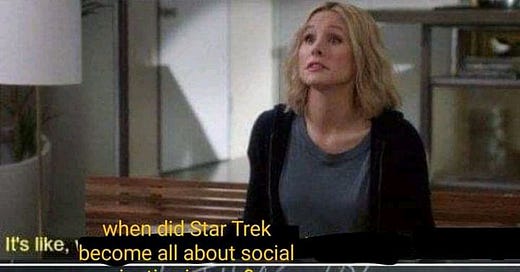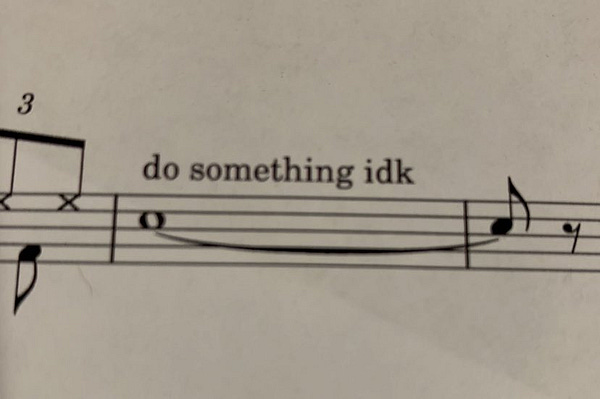EPISODE 715 : I HAVE A BAD FEELING ABOUT THIS
When did Star Trek become all about social justice issues?
POP CULTURE SPIRIT WOW
Hi! Welcome to the Wow. I fear today the main source of any Wows you might have is going to be the degree to which I go on and on about Star Trek, Star Wars and Marvel.
In defense, let me point out, I am a nerd. Also I was outside way too much today and so probably this is sun stroke and a cry for help and now don’t you feel bad about judging me.
(Also, if deep dives into nerdom is not your thing right now you can always jump to the article suggestions and three tweets. I will only judge you.)
So since I wrote this article last week about Star Trek: Picard, I have been haunted by a terrible question: Is it possible that Star Trek is actually better than Star Wars?
Pretty much my entire life has been predicated on the very strong conviction that the answer to that question is, No, God no, never, die Kirk die.
(Have I ever mentioned I never really got the whole “Kirk is cool” thing? Really the only way I could understand Spock’s fascination with him was that it was um, more than fascination. Ain’t no party like a Pon Farr party!)
I have always found Star Trek 1.0, which for me includes pretty much everything from the original series until 2017 except for a lot of Deep Space Nine, in a word, lame. Most of the characters don’t grow or change—seriously, how did Riker ever grow? Or Kirk? Or Janeway?
The plots never develop in realistic ways; half the time the story turns on some version of a doppleganger or alternate universe, and the other half it’ll have a great set up and then some deus ex machina so preachy it might as well end with Picard looking into the camera and saying, “And that’s one to grow on.” And everything is super clean and super boring.
Star Wars is messy, like real life. Every scene feels like a glimpse into a much bigger world, rather than a cheaply built planet set that doesn’t extend beyond the screen. People’s motives are more complicated and in conflict. There’s an active sense of humor at work. The heroes are allowed to look silly from time to time, and they are challenged to grow. It is better in every way.
But then the new Star Trek 2.0 shows started to show a lot more character development and serialized storytelling. And while there’s still that idealism from 1.0, that belief in our ability to get past our differences, it’s now a challenge for the show and its characters rather than a mandate that every episode must underline again.
Star Wars is still good. The Mandalorian is a brilliant new addition to that universe. But here’s the thing that Star Trek has going for it—and has always had going for it—that Star Wars has always struggled with: representation. The original Star Wars trilogy is basically a series about a bunch of white kids and, eventually, their kind of crooked Black friend. The prequels, pretty much the same, except instead of the crooked Black friend we get the badass Black super hero.
Finally in the sequels we start to see a few more people of color enter the story, but just a few. (And one of them, Rose Tico, gets more or less run out after just one movie.)
We also get our first two female Jedi in the non-animated world. (How crazy is it that in the era when the Jedi supposedly were doing great we don’t get even one major female character?) But in terms of sexual orientation, the most that Disney could muster was to have two no-name Resistance characters hold hands in the background after the Emperor is defeated.
Meanwhile Star Trek: Discovery’s main cast—just the characters in the credits—include a Black man and a Black woman—and she’s the captain; two gay men—one white, one Latino-- and their non-binary ward; and an actor who plays a straight alien man.
If you expand beyond the opening credits cast you’ve also got a Vietnamese transgender man, a white lesbian, a black woman and white woman who definitely seem into each other; an Asian man and a white straight woman.
Star Trek: Picard, which has a much smaller cast, includes two straight white men; three straight white women; a straight Latino man; a lesbian couple—one white, one biracial; and a guy who is half-Maori.
Strange New Worlds, the new Star Trek show, has nine characters on the poster. One is African American, one is Nigerian, one is Asian, one is Latinx, five are women, and one is legally blind.
Star Trek has done all this without really even batting an eye. And that’s because it’s part of how they have always imagined what a hopeful future looks like. And so the original Star Trek had Nichelle Nichols as the Kenyan Nyota Uhura, George Takei as the Japanese helm officer Sulu and Walter Koenig as Chekov, a Russian with a thick accent, which was a bold thing to do during the Cold War. But for Star Trek, a future to aspire to is one in which everyone has a place at the table.
Star Wars has no such notions of inclusion or diversity baked into its DNA. In fact it has a lot fighting against any of that, starting with the fact that the movies all end up being mostly about this one small family. When there was just the original movie, it was better in a way. Luke was just some kid; he could be anybody.
This was a big part of what the much-debated Episode VIII: The Last Jedi was trying to get back to, by showing the Force at work in different ways among characters who were not Jedi. Even the reveal that Rey’s parents were nobodies who just dumped her was about shattering the Skywalker monopoly on story. It didn’t stick, unfortunately.
On the other hand, what is cooked into Star Wars is this idea of being a window not just into a story but a whole world. And really that’s what allowed The Mandalorian to exist as a concept. This isn’t just a universe of Jedi and Sith. It’s filled with normal people and aliens and droids and stuff. And notably, Mandalorian has been a TON more diverse than the Star Wars films, though queer characters seem to remain the line that cannot be crossed.
The Star Wars motto seems to be, We don’t have to have queer characters (or just diversity) as long as we tell good stories.
Meanwhile the Star Trek motto is, We have to have a diverse cast because otherwise our story won’t be very good.
Speaking of super nerd stuff (I warned you), I had a piece published last week about Doctor Strange in the Multiverse of Madness in which I pretty much burned the film down and took great pleasure in it.
In my defense, one of the film’s writers did an interview where he pretty much said, “My script was boring so I added crazy shit.” That’s pretty much a direct quote. And if you look at the script and pull out the crazy shit he was talking about, it is pretty much boring. Marvel boring, which is to say, engaging in the moment, clever, funny, visually cool—but then ultimately in the end kind of the same old thing once again. Most scripts would give a lot to be at the level of Marvel boring.
It’s like this: David Copperfield was apparently a great magician, but if I saw him 20 times would I still be blown away? Magic 8 Ball says, Doubtful.
Marvel has done more than 20 movies at this point, and a fair number of them I think really hold up: Winter Soldier, Avengers: Infinity War, Black Panther, Guardians of the Galaxy, Thor: Ragnarok, the Spider-Man 1 & 3.
But a lot of the rest are more “here’s another movie” to satisfy you for now. Which they do, and then they don’t. And that’s not Kevin Feige’s fault; at this point how could we not know most of his tricks and be starting to get bored of them?
But it may mean that at some point the way forward is to have Feige take over the X-Men universe as a separate thing and let someone else take a crack at Avengersland.
Io9 did a piece last week asking, what exactly is “Phase Four” of the MCU about? The first three phases were all building to Thanos and the end of the universe. But that all wrapped up three years ago. (It’s been that long!) So what are we doing now?
Here’s my take: First, they decided to take the time to really explore what the Snap and the Blip would have done to the MCU. And I think that’s great. Both of those ideas were so bold; of course they should explore their implications.
Then, they were also trying to do the impossible, which is to give us in the audience a breather from all the interwoven storytelling and just tell some fun stories. Spider-Man: No Way Home fit that bill. Black Widow, Eternals and Shang Chi, too. I’m guessing Thor: Love and Thunder will as well, and the TV shows too.
But this was definitely impossible, because even as they were not doing some massive epic, they were still putting out movies. In a weird way the pandemic was a blessing for Marvel, because it stopped their releases. Or it could have been. But then instead they were releasing all of these TV shows, and so we really never got a break from the MCU.
The third thing I think they’re up to is building toward another massive epic. Doctor Strange introduces this idea of different universes colliding with each other and at most only one gets to survive. In the comics, this was a story that writer Jonathan Hickman built over 3 or 4 years, which probably tracks to about 5-7 years worth of movies.
The Loki TV series also introduced this time-traveling villain called Kang who has many versions in different universes, who could become the new Thanos somehow creating these collisions. But I wonder if it’s more likely that he’s the villain for the next couple years whose denouement ends up leading more directly into the full-on multiverse catastrophe, with characters having to battle versions of themselves (Marvel loves a great war amongst yourselves).
The funny thing is, the comic version of all this is incredible. Definitely one of my favorite comic book stories. And yet, I think of the next seven years of this and I get exhausted.
Just like you’re probably feeling right about now from all this…
(Although if you’re not, Bleeding Cool did a great piece about what seems to be a weird new trend in Marvel movies: Evil Moms.)
Also under Articles, here are three pieces I really want to read right now: The afterlife of George Carlin; James Earl Jones on what he was thinking in the middle of the Star Wars saga; and the insane story of a children’s book writer who was fired for reading to kids a book about farting butts.
America, you so crazy right now. Speaking of which…
THREE TWEETS
For da Crazy Americans:



For da Catholics:
For da Musicians:
Be good to yourself. And have a great week!










